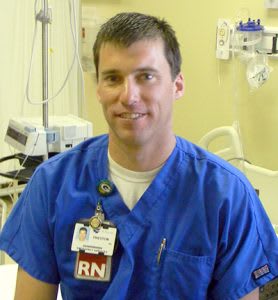“I remember when we tried CPR and it didn’t work”: Reflections on the accelerated nursing program, part 3
Each blog post is dated and contains accurate information as of that date. Certain information may have changed since the blog post publication date. If you would like to confirm the current accuracy of blog information, please visit our ABSN overview page or contact admissions at (866) 892-6463.

On February 23, Marian University for St.Vincent Health hosted a panel of current students and alumni who took questions from the audience on Marian’s accelerated nursing program. This is our final post in the series. To read part one, click here. To read part two, click here.
Q. What’s the starting salary range for a registered nurse?
Preston Meng, class of August 2011: My understanding is that St.Vincent, IU Health and Community are competitive with each other in terms of salary. A lot of it’s based on how much you want to work – night shift differential, weekend options, holidays – there are a lot of options.
Q. Alumni and students in your last semester, is it easy to find a job?
Preston: Through your clinical rotations, you get a good foothold in the St.Vincent Health network, talking to nurse managers and so on. Marian University has a good reputation, and they know students in the second-degree program have that life experience; we know what it’s like to go to work. I graduated in August, but I was hired by St.V in May. All of us got jobs right away.
Kris Shallenberger, outreach coordinator: If you think about it, the program is like a 16-month job interview.
Grant Wright, class of August 2011: I was set on working in St.V’s ICU and broke the dam on them not hiring new graduates. They see what you’re capable of.
Julie Smith, site director: We have a high number of graduates from the December 2012 class who have offers from St.V pending the NCLEX.
Q. What about job shadowing?
Grant: If you don’t know if this is what you want to do, or you might have a false notion of what nursing is, job shadowing a nurse will expose you to certain realities you might not know about.
Nick Dascoli, class of May 2012: Before I started the program, I had friends who were nurses, so I shadowed them before I was even accepted. It doesn’t have to be a formal process.
Q. What are the tests like?
Kim Shelly, class of May 2013: It’s just like any other university; some you’re going to love, and some you’re not.
Grant: Remember, thinking like a nurse isn’t like anything you’ve ever done before. It’s not just regurgitating information; it’s reviewing case studies and applying what you’ve learned.
Julie: You can memorize every page and every question, but our tests aren’t designed for one-word answers. The tests are preparing you to think like a nurse.
Q. How long is the NCLEX?
Grant: The length depends. It’s a smart test that adapts as you go along. It’s like it can sense your weaknesses. (laughs)
Nick: It can take an hour or up to six hours, depending on how well you answer the questions.
Preston: The Kaplan course you take in the program is great, and it’s part of your tuition. There were practice tests, and instructors walk you through it. I felt really prepared and took it as quickly as I could because I had a job waiting. But some people waited to gain more study time.

Q. How do you deal with death and dying?
Preston: I remember when we tried CPR and it didn’t work. I also remember bringing a new baby into the world. For every one person who dies, you save 10 or 20 others. Those moments, the patients and their families thanking you – that’s what stays with you. So you go home, hug your kids, and go back to work the next day.
Grant: In ICU, you learn the value of being able to die peacefully. You’re not supposed to live forever. St.Vincent is religiously affiliated, so there are chaplains, social workers, and other people to help. You can be there in a faith-based way.
Cristina Fontana, class of August 2013: You have to remember you’re there for a reason. You have a calling others don’t have, and you play an important part in the patient’s life and the family’s life. We don’t know when anyone’s going to live or die. You find the strength.
Q. Do you get over the gross stuff?
Nick: I used to throw up at anything that wasn’t normal, but when you’re working, it’s different. Things don’t hit your senses the same way they used to.
Jeff: You feel a strong sense of duty.
Ready to take the next step in your nursing career? Fill out our contact form to get started.
